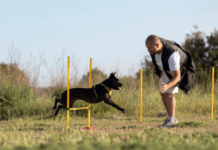Last Updated on July 21, 2024 by Dogs Vets
When it comes to training a bird dog, a key question arises: Is it more beneficial to specialize in one bird species or to expose your dog to a variety of birds? This decision ultimately shapes your dog’s skills, instincts, and hunting success.
The Case for Specialization
Focused Training for Optimal Performance
Kyle Warren, the owner of Paint River Llewellins in Michigan’s Upper Peninsula, champions the idea of specialization. His goal is clear: to develop the ultimate ruffed grouse dogs.
“I run my dogs almost exclusively on ruffed grouse,” Warren explains.
“These birds are notoriously wary, and a dog must possess both intelligence and patience to handle them effectively.”Warren’s approach is rooted in the concept of epigenetics, which suggests that a dog’s environment can influence its genetic development.
Most people don’t think of Airedales as a bird dog. Not so! With the proper training they make awesome bird dogs. Max is our 2nd pheasant hunting Airedale machine. pic.twitter.com/DneP2a86UF
— Gene Galitz, Hunting, Fishing or Jeepin’ somewhere (@GeneGalitz) November 16, 2021
He believes that repeated, high-quality encounters with grouse enhance a dog’s hunting instincts, which can then be passed down to future generations. “The more grouse contacts a dog has, the better it becomes,” he asserts.
To kickstart the training process, Warren introduces puppies to pigeons at 9 to 10 weeks old. By the time hunting season arrives, the young dogs are ready to tackle grouse with confidence and purpose.
He emphasizes that early exposure to grouse is crucial; he avoids other species like woodcock to maintain focus.
Experience in the Field
Warren’s commitment to specialization is evident in his hunting practices. Last year alone, he logged over 500 hours in the field, covering nearly 1,100 miles.
This extensive experience allows his dogs to learn the nuances of grouse hunting—understanding where to find birds and how to navigate various terrains. “That experience is where their confidence and style come from,” he notes.
The Benefits of Diversity
Accelerated Learning Through Variety
In contrast, Mike Thompson, owner of Eagle Rock Setters in Butler, PA, advocates for a more diverse training regimen. He regularly incorporates a wide range of birds into his training sessions, including pheasant, chukar, Bobwhite quail, and woodcock.
“The variety of experiences really accelerates the dogs’ learning process,” Thompson explains.Thompson categorizes birds based on their behavior and habitat preferences.

For instance, pheasants and grouse are solitary and wary, while quail and pigeons tend to hold tight. By exposing dogs to different types of birds, he helps them develop foundational skills essential for successful hunting.
Diverse Training Environments
Thompson’s training grounds are rich in diversity, featuring a mix of cover and food crops. He plants various grasses and selectively mows to create a natural habitat that mimics wild conditions.
This environment allows dogs to learn how to locate birds in different terrains, preparing them for hunts in both southern grasslands and northern forests.
A hunt for chukar from Utah’s Wasatch Range.
Gun Dog Magazine’s Wild Upland / ALL NEW TONIGHT AT 6:30 PM ET. #FindYourAdventure #hunting #outdoors #bird #birdhunting #Utah #chukar pic.twitter.com/93pTa3Mplx
— Outdoor Channel (@OUTDChannel) May 28, 2024
Additionally, Thompson employs a mix of singles, pairs, and coveys in his training. This approach teaches dogs how to handle varying numbers of birds, which is crucial for developing their hunting instincts. “Teaching a dog to block while honoring another dog on point is a game-changer for their owners,” he says.
Making the Choice
Ultimately, the decision to specialize or diversify in bird training depends on your goals and preferences. Whether you choose to focus solely on the birds you hunt or embrace a broader range of experiences, both approaches can yield successful, skilled hunting companions.
As the saying goes, “Do what is right, not what is easy or popular.” The path you take will shape your dog’s abilities and your hunting experiences for years to come.
Source: gundogmag.com
Fact Check
We strive to provide the latest valuable information for pet lovers with accuracy and fairness. If you would like to add to this post or advertise with us, don’t hesitate reach us. If you see something that doesn’t look right, contact us!























